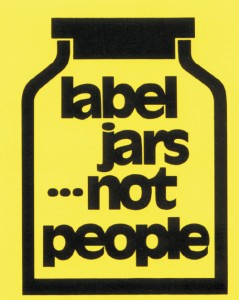In my previous post, “Labeled Disabled”, I highlighted the divisions among isolated interest groups in American society. Continuing along this vein, I will explore an alternative approach that could potentially break the stigmas attached to disability in our society.
interest groups in American society. Continuing along this vein, I will explore an alternative approach that could potentially break the stigmas attached to disability in our society.
American society has always nurtured its “rugged individualism” and its proudly independent character. We take pride in productivity, innovation, and the ability to clear our own pathways to the “American Dream.” As a particularly capitalistic society, we also welcome aggressive competition. The emphasis on competition and individual success are manifested in American culture through sports, education, private enterprise, and the culture of consumerism.
Unfortunately, these values deemphasize the merits of collective interests, community, and interdependence. When it’s “every man for himself,” those with the fewest opportunities are more likely to be devalued as individuals, in addition to being left behind. Persons with disabilities (PWDs) living within this frame of expectations face the double challenge of a) social exclusion for not being able to perform at “normal” ability levels, and b) internalizing the pressure of competition.
The Special Olympics is an organization that provides persons with disabilities the opportunity to participate and excel in sports without facing discrimination. Although this empowering program builds confidence and sportsmanship among PWDs with varying levels of disability, in the long-run it’s still an outgrowth of the culture of competition. Instead of starting from ground up within the disability community, it models itself after the Olympics – just the “Special” version of it. Rather than questioning mainstream standards of achievement, the Special Olympics borrows the ideology that competitive sports (once the playing field is leveled) are still the key to “empowerment, competence, acceptance and joy.”
Instead, imagine an integrated society in which PWDs can contribute within a set of expectations that incorporate and neutralize disability. A society in which disability is not perceived as a hindrance to personal achievement, but as a characteristic that only partially shapes an individual’s experience. A system in which independence is encouraged, but within the greater context of collaboration. Seems a bit utopian? Maybe not!
Matthew Rodieck, an aid worker in Afghanistan offers his observations of disability in Afghanistan, Disability, and the West’s Limiting Labels. He presents a pragmatic cultural approach to disability. Disabilities, while acknowledged in Afghanistan, are not necessarily singled out as debilitating features among Afghans, especially in rural areas. Rather, all members are expected to contribute labor in whichever ways they can manage, regardless of their level of ability. In this type of environment, labeling a disability serves little practical purpose. Instead, it unnecessarily draws attention to immaterial physical/mental differences, which seems more like “imposing romanticized Western values.” In the U.S. we can apply this by changing the attitudes of employers. Since many people still hold onto the myth that persons with intellectual or physical disabilities are either incapable or invaluable as workers, there is a great amount of discrimination against PWDs, which results in higher rates of unemployment. Employers should realize that investing in accommodations for disabled employees is an investment for society as a whole, and that employees with disabilities are more likely to be able to assist customers or clients with disabilities. As noted by UN Enable, the inclusion of PWDs in employment will not only boost a company’s reputation and diversify the workforce, but it will improve the way it develops solutions to challenges that require different perspectives.
By downplaying the disability identity, I don’t mean to imply that societies shouldn’t continue to move forward with inclusive legislation, establishing health care facilities, and instituting programs that focus on raising awareness about disability issues. This isn’t the one and only solution. I also don’t wish to minimize the disadvantages and discrimination, including barriers to education, health care, and employment that can be solved only by recognizing disability. What I am suggesting is that we rethink the labels and individualistic attitudes that needlessly magnify disability. Minimizing the degree of “difference” in our perceptions of disability, and focusing instead on the interdependence of individuals and the value of each contributor, is an attitude that mainstream America has yet to explore.
Sarah Amin is a Program and Research Intern with the SISGI Group’s Research Division focusing on Human Rights Advocacy, International Disability Rights and Gender Equality/Gender Mainstreaming. To learn more about the SISGI Group visit www.sisgigroup.org.

